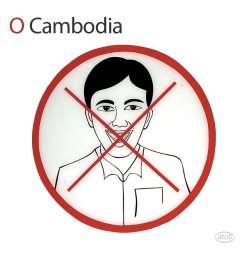
Support us financially by purchasing
this through MusicWeb
for £12 postage paid world-wide.
 |
O Cambodia
Chinary UNG (b.1942)
In Memoriam, for piano trio [11:00]
Him SOPHY (b.1963)
The First Strike [12:30]
Jack BODY (b.1944)
O Cambodia [21:06]
Gillian WHITEHEAD (b.1941)
The River Flows On... [24:35]
Tray So (Him Sophy, Him Savy, Keo Dorivan (traditional Cambodian folk instruments))
NZ Trio (Justine Cormack (violin), Ashley Brown (cello), Sarah Watkins (piano))
Vocals: Keo Dorivan and Him Sophy (In Memoriam), Him Sophy (The First Strike), Him Sophy and Him Savy (O Cambodia) and Him Savy (The River Flows On...)
rec. Auckland and Hamilton in March 2011, following live performances at the Auckland International Festival.
ATOLL ACD541 [70:23]
This recording documents an extraordinary collaborative project initiated by NZ composer and Asian specialist Jack Body for the 2011 Auckland Arts Festival. It includes four specially composed and unique works that pay tribute to the 2.5 million or more who were killed in the genocide carried out in Cambodia during the reign of the Khmer Rouge under Pol Pot (1975-79). Each composition was commissioned either by individuals or groups in New Zealand thanks to this project. What emerges is a powerful and moving set of musical documents.
Chinary Ung explained his piece In Memoriam thus “In Memoriam begins with an evocation in the first section. The middle section is turbulent and represents, musically, peoples’ suffering. The last section is a display of a shamanistic attempt to dispel suffering”. In this work two voices are used to great effect against the background of the piano trio. The composer explained that most of the vocalisation is meaningless and when it isn’t sung is either spoken, chanted, shouted or whistled. The piece is a reworking of Chinary Ung’s original composition for string quartet Spiral X.
The First Strike recounts a personal experience by composer Him Sophy in which he witnessed the striking of a fellow worker when he was a thirteen year old rice planter. He learned later from a girl who was also working in the field that day that it was her father and that she had never seen him again afterwards. His crime was being a former urban dweller and therefore by definition suspect. In this work following an introduction by the trio we hear Cambodian folk music expert Keo Dorivan speak and play the bamboo flute in an extremely beautiful and evocative section followed by the composer who recounts the event with trio accompaniment. Then as Keo Dorivan sings the cello accompanies before a drum, flute and finally, piano enter to great effect in a gently reflective section that closes the work.
Jack Body’s composition O Cambodia that is both the disc’s title as well as the entire project’s is cast in eight sections which include shouted instructions used by camp guards at the notorious Tuol Sleng prison in Phnom Penh and a salutary warning from David Chandler, scholar of modern Cambodian history. Opening and closing with the Khmer Rouge’s national anthem a bitter irony is invoked since its words called for the creation of “a new and better society, democratic, egalitarian and just”. I advise anyone who doesn’t remember or know about this terrifying period to read the Wikipedia entry which thoroughly details the distortion of those otherwise lofty aims. The work also includes common folk sayings, a Cambodian Buddhist song and some traditional Cambodian music played on both flute and a kse diev, a Cambodian single stringed instrument whose practitioners today are few in number and which is as the composer notes “...for me a metaphor for cultural loss”.
The disc ends with the longest work The River Flows On... by New Zealand composer Gillian Whitehead who studied with Peter Sculthorpe and Peter Maxwell Davies. The idea she wishes to convey with her work is that despite the worst events that can befall a nation the nation remains and will eventually move on within a changed world. This idea is inspired by the Cambodian proverb “the rowing boat passes, the river bank remains”. Beginning with Prophesy which presents an ancient saying whose origins are lost in the mists of time it moves to the story of one individual’s experience in which Keo Dorivan recounts the personal testimony of Sokha Mey who was a young girl when Pol Pot’s forces swept to power. It ends with The River Flows On... that places her experience in the context of a future in which she was able to make a new life for herself in New Zealand. The Cambodian language, at least to the uninitiated, is extremely musical so that even when it is simply spoken it fits very well against both the trio and the traditional instruments.
This disc which is very well presented, recorded and played is a profoundly moving experience and a salutary lesson, particularly in the context of what is happening today in the Middle East, the trick however, is to learn it. Those who established this project deserve many congratulations and it is quite humbling to note that it is in a small nation like New Zealand that projects such as these can be set in motion and receive the necessary funding to achieve success. The disc deserves to be heard by many for all kinds of reasons, not least musical.
Steve Arloff
|














